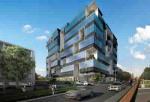Tourism, Airbnb growth boost demand for Cape Town CBD Apartments
 The phenomenal Airbnb growth trend is just one of the factors driving demand for Cape Town CBD property.
The phenomenal Airbnb growth trend is just one of the factors driving demand for Cape Town CBD property.
While many areas are beginning to report a notable slow-down, Cape Town’s CBD and City Bowl areas are still just about as buoyant as you could ask for, especially if you are a seller of an apartment.
Described as the Uber for accommodation, Airbnb challenges the traditional hotel and guest house industry by enabling ordinary property owners to rent out rooms and even entire homes to guests from anywhere in the world.
The phenomenal Airbnb growth trend is just one of the factors driving demand for flats in the area and, according to Seeff property group based in Cape CBD, activity is still at a notable high.
Aside from residential buyers, there has been excellent demand from foreigners, comprising about 16% of actual sales in the CBD and 11% of the City Bowl for the year ended July.
Rising demand now though is coming from investors looking to capitalise on the rise in prominence of Airbnb. With the summer tourist season now here, we are seeing well-priced apartments literally still fly off the shelf within a month as buyers look to acquire an asset in this high growth area and turn it into an Airbnb money spinner.
In the City Bowl for example, the latest Propstats data shows that apartments are spending just 30 days on average on the market, but many are in fact selling within a day to a week. That is remarkably faster than the market average of 14 weeks (around 3 months) recently reported by John Loos in the FNB Property Barometer for the third quarter of this year, say the agents.
When it comes to City bowl apartments, the average difference between the asking and selling price is still a negligible 3.6%, testimony to the still positive market if, add the agents, you consider the wider economic landscape and interest rate and cost hikes this year.
Sellers can now expect to sell at around R31,461/sqm on average. The average selling price for a City Bowl apartment is now a rather significant R2.83m. That is over R1m, or some 60% higher than the 2014 average of R1.76m.
In the central city, sellers are now achieving on average around R28,631/sqm, but the price can range notably higher depending on the complex and location, ranging to as much as R40,000-R50,000/sqm at the top end.
The average selling price now stands at around R2.23m, up from R1.634m in 2014. That is well over R500,000, or some 36% higher. Sellers are also getting on average within 5% of their asking price. A significant number of sales though are still for the full or just about full asking price.
Airbnb has in the spate of just two short years grown enormously and now controls the largest volume of short-term rental stock in the country. The advantage for property owners is of course that holiday makers from across the globe have access to their property stock, says Rautenbach.
According to TripAdvisor, a complex such as The Icon, a mixed-use block situated in the banking district in the Cape Town CBD with amenities such as 24-hour security, a swimming pool and gymnasium and a Vida e café, Food Lover's Market, laundromat and many more located on the ground floor can achieve a rental of R948 to R2026 per day based on average rates per luxury room. A one-bedroomed flat here is priced around R2.59m.
Nicola D’Elia, Airbnb managing director for Africa and Middle East, recently reported that South Africa was the most popular destination for Airbnb guests and within that, Cape Town was by far the biggest choice. Cape Town has grown by 190% to 7 500 rooms and he said that inbound guests to the country, with Cape Town being a top choice, had grown by a phenomenal 250% to some 134 000 guests staying an average of 4.9 nights.
D’Elia further noted that the depreciation of the rand over the last two-plus years makes South Africa an attractive proposition for foreign visitors who make up 72% of the local Airbnb visitors.
And, further tourism growth to Cape Town is on the cards. Tim Harris, CEO of Wesgro recently also announced that additional flights into Cape Town amounts to 400,000 additional seats coming from five new air routes and four expansions. This includes additional flights from the UK, Germany, Nairobi, Livingstone (Malawi), Maun (Botswana) and more from Emirates and KLM.
Most Popular
Watch: A Credible Market, the need for Standards in Property Industry
Valuation standards have a significant role to play in helping to regulate professional practice at national, regional and global levels, promoting professional ethics, integrity, impartiality and trust in valuer activities in the property industry. ... Full story











